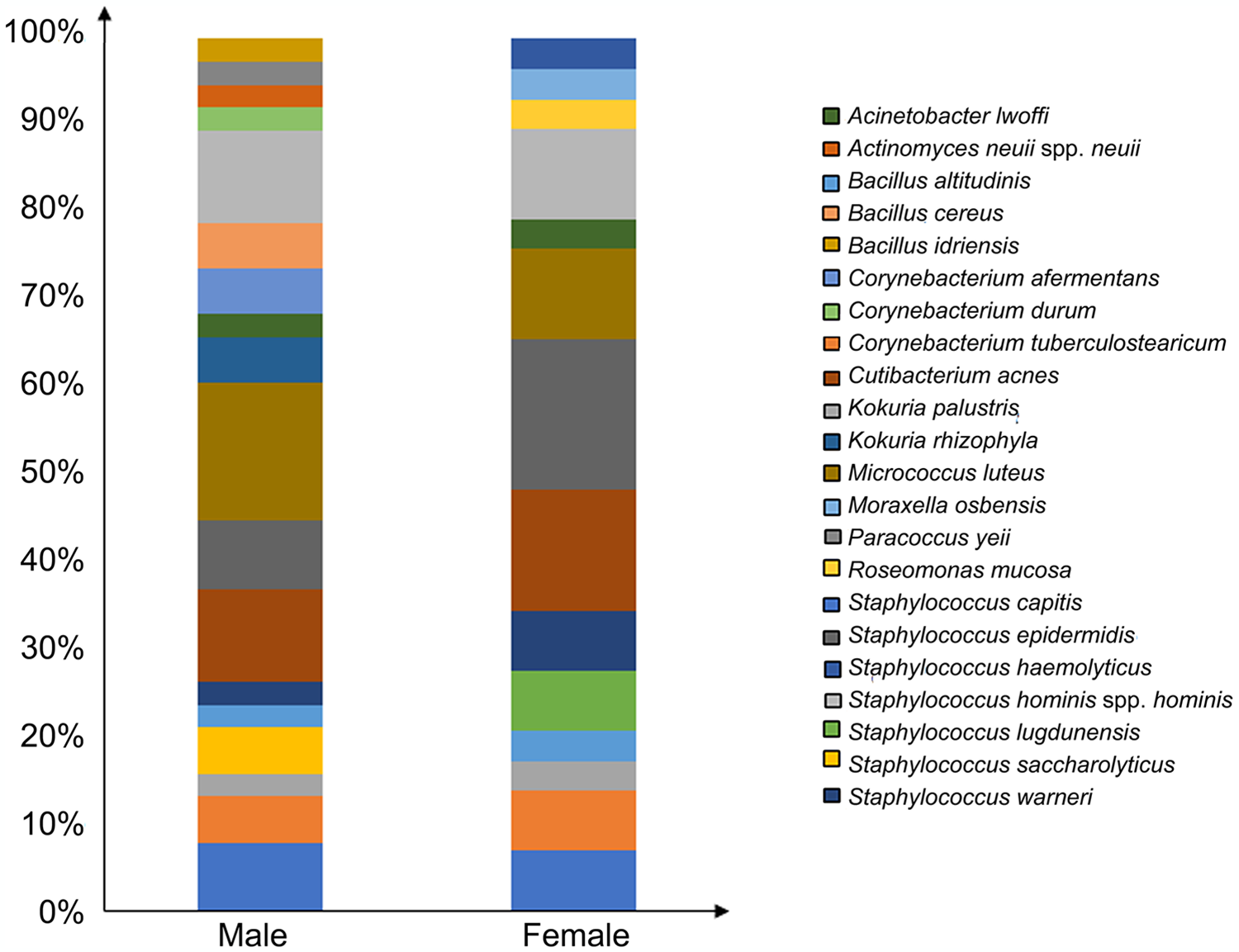The skin microbiota represents many microorganisms that live in equilibrium, establishing an interspecies balance of microbiota community. The composition of skin microbiota depends on the body site, age, sex, and skin pH.
The predominant microbial species of skin microbiota belong to the Staphylococcus, Corynebacterium, Streptococcus, and Propionibacterium genera. Staphylococcus epidermidis (S. epidermidis) is the most reported Staphylococcus spp., and it plays a crucial role in maintaining microbial balance on the skin.
In healthy skin microbiota, S. hominis, S. lugdunensis, and S. epidermidis exert antimicrobial effects against the Gram-positive bacteria S. aureus. Any perturbation of skin microbial homeostasis can lead to dysbiosis, which is characterized by a reduced abundance of beneficial microbes like S. epidermidis and an increased abundance of pathogenic microbes like S. aureus.
Skin microbiota dysbiosis has been found to be associated with various skin diseases, including acne, atopic dermatitis, folliculitis, and psoriasis. An increased abundance of S. aureus has particularly been observed in patients with atopic dermatitis.
In this study, scientists have investigated pomegranate peel extract's antimicrobial and anti-adhesive effects against skin microbiota strains. They have also evaluated the species-specific activities of the extract.
Previous studies have shown the antibacterial effects of pomegranate peel extract against a variety of bacterial strains, including S. aureus, Escherichia coli, and Pseudomonas aeruginosa. Several phenolic compounds present in pomegranate are responsible for its antimicrobial activities.
Study design
The scientists collected skin microbiota samples from six healthy volunteers and three volunteers with atopic dermatitis. Among isolated bacterial colonies, they selected S. epidermidis and S. aureus for further experiments.
They prepared pomegranate peel extract using n-butane and dimethyl ether solvents and analyzed it for antimicrobial and anti-adhesive (interference with biofilm formation) activities against the selected bacterial strains. They used Galleria mellonella larvae in vivo model for the toxicity test of the extract.
Important observations
A total of 67 microorganisms were identified from the skin of healthy volunteers, with S. epidermidis, Micrococcus luteus, Cutibacterium acnes, and S. hominis being the most abundant bacteria. The main bacterial genus was Staphylococcus.
A variation in skin microbiota composition was observed among volunteers depending on their geographical regions of origin and their skin changes. The only strain isolated from volunteers with atopic dermatitis was S. aureus.
The phytochemical analysis of pomegranate peel extract identified catechin, quercetin, vanillic acid, and gallic acid as the main bioactive compounds.
 Bacterial abundance of skin microbiota in back skin of volunteers enrolled in the study: Male and female distribution.
Bacterial abundance of skin microbiota in back skin of volunteers enrolled in the study: Male and female distribution.
Antimicrobial activity
The comparison between the two extracting solvents revealed that dimethyl ether-based extraction has the highest antimicrobial activity against bacteria, with minimum inhibitory concentration (MIC) ranging from 1 to 128 milligrams per milliliter.
Anti-adhesive activity
The anti-adhesive activity of dimethyl ether-based pomegranate peel extract was determined against S. epidermidis and S. aureus mono and dual-species biofilm formation.
The findings showed that the extract significantly increased the biofilm formation ability of S. epidermidis and significantly reduced the biofilm formation ability of S. aureus. Biofilm formation is a complex process in which microorganisms adopt a multicellular behavior that facilitates and prolongs their survival in diverse environmental niches.
Further analysis of the anti-adhesive effect on S. aureus at 24 hours revealed that the extract is capable of reducing bacterial biomass by 16% without interfering with the growth rate of S. epidermidis.
Toxicity test
The toxicity testing of dimethyl ether-based pomegranate peel extract using Galleria mellonella larvae revealed 90% and 80% survival rates of the larvae at the highest extract concentration after one day and seven days, respectively.
The estimated survival rates were similar to larvae treated with a buffer solution (control), indicating the non-toxic action of the dimethyl ether-based pomegranate peel extract.
Study significance
The study finds pomegranate peel extract as a practical, non-toxic intervention for restoring skin microbiota homeostasis in a species-specific way. The dimethyl ester-based pomegranate peel extract prepared in the study effectively restores beneficial bacterial species (S. epidermidis) and eliminates pathogenic bacterial species (S. aureus).
An increased abundance of S. aureus is known to be associated with the formation of skin lesions, which are challenging to treat because of the bacteria's biofilm-forming ability and drug-resistance acquisition.
One of the useful strategies to restore skin microbiota homeostasis is to promote the growth of beneficial bacteria, such as S. epidermidis, which can effectively inhibit the expression of S. aureus virulence regulator gene, quorum-sensing, and eventually biofilm formation.
Potent antioxidant, anti-inflammatory, and antimicrobial activities of pomegranate peel-derived phenolic compounds, including catechin, quercetin, vanillic acid, and gallic acid, might be responsible for observed skin benefits. Previous studies have shown that catechins exert antimicrobial effects on S. aureus and E. coli by damaging cell membranes.
Overall, the study suggests that pomegranate peel extract can be considered as part of topical formulations using recycled waste and green extraction techniques in compliance with the One Health approach.